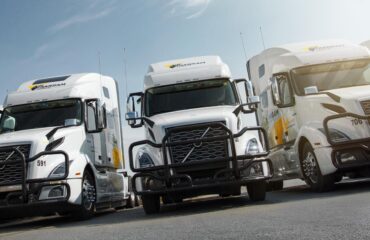Traditionally, business models, processes, and functions in the transportation and logistics industry have been defined by infrastructure and truck possibilities. However, with the advent of the digital era, technology is changing the way things are done, and as a result, the trucking business benefits from increased efficiency to cost savings. As a transportation company that thinks about tomorrow, future technologies are what we are always keeping an eye on to maintain a leading edge in the trucking industry.
Let’s look at five technology and innovation trends that are transforming the trucking industry:
1. Trucking technologies
Thanks to the Internet of Things (IoT), AI, LiDAR, etc., trucking companies can easily track and analyze statistics of their fleet, drivers, and freights. They can see where their trucks are, estimate travel times and weather conditions, and even get real-time traffic updates. That helps them plan routes better and avoid traffic congestion, saving time and money. Additionally, such technologies as Samsara Telematics can also monitor driver behavior and improve safety on the road.

2. Electric trucks
A few years ago, electric trucks were nothing more than a pipe dream. Now they’re becoming a reality. More logistic companies consider electric trucks a viable option for their fleets. And it’s not just because they’re better for the environment, but they’re more efficient and cost-effective in the long run. They also have a lower cost of ownership and require less maintenance than traditional diesel trucks.
3. Autonomous trucks
This is perhaps the most talked-about trend in the trucking industry. Self-driving trucks are still in the development stage, but they hold a lot of promise for the future. With self-driving trucks, companies can transport goods without a driver. However, many people fear the impact this will have on truck drivers. But it’s important to remember that self-driving trucks will not replace drivers completely. Instead, they’ll free up drivers to do other tasks, such as planning routes, monitoring shipments, loading and unloading cargo, maintenance, and more.
4. Energy-saving and environment-friendly technologies
Given the logistic industry’s immensely un-green impact, more and more trucking companies are looking for ways to save energy and be more environmentally friendly. New technologies, such as biofuels, electric trucks, and solar-powered trucks are helping companies reduce their carbon footprint. In the future, we’ll see even more energy-saving and environmentally friendly technologies being implemented in the trucking industry.
5. New ways of transportation
One of the latest trends in transportation is the use of drones. While they’re primarily being used for personal use right now, there are many potential applications for drones in the trucking industry. For example, trucking companies can use drones to provide security for trucks, deliver small packages, inspect vehicles, or even deliver parts and supplies to remote locations. This would save a lot of time and money, as well as improve customer service.
Impact of technology on trucking
Undeniably, technology has had a significant impact on the trucking industry. It has made it possible for companies to track their fleet, plan routes, and save time and money. But it has also created some challenges for the industry.
Here are some of the pros and cons of technology in the trucking industry:
Pros
- Greater efficiency. Trucking companies can dispatch trucks more efficiently and reduce empty miles by using GPS tracking and similar technologies. That saves both time and money.
- Increased safety. Technologies like ELDs and telematics help monitor driver performance and ensure that they’re following safety regulations. That helps reduce the number of accidents and improve safety for both drivers and the public.
- Lower emissions. Energy-saving technologies like electric trucks can help to reduce the trucking industry’s impact on the environment.
- Reduce traffic congestion. Trucking companies can plan routes that avoid traffic congestion by using data and analytics. That helps to save time and fuel, as well as reduce emissions.
Cons
- High cost. Many of the technologies used in the trucking industry are expensive. That can be a challenge for small trucking companies that don’t have a lot of capital.
- Electric cars can’t travel as far. One major drawback with electric trucks is that they charge for too long, and the batteries can’t hold enough power for long journeys. That could be a problem for long-distance trucking.
- Infrastructure issues. For some new technologies to work, the trucking industry needs to invest in infrastructure, such as charging stations for electric trucks. That can be a challenge, especially in rural areas.
- Privacy concerns. Some people are concerned about the amount of data collected by trucking companies. They worry that it could be used to track people’s movements and invade their privacy.
- Dependence on technology. If something goes wrong with the technology, it could cause serious problems for the trucking industry.
- Job losses. If autonomous trucks become widespread, they could put many truck drivers out of work.
Technologies at Transam Carriers
At Transam Carriers, we’re always ahead of the curve regarding technology. From tracking and tracing to electronic dispatch and telematics, we utilize the latest and greatest technologies available to ensure our company operates at peak efficiency. That allows us to provide our clients with the best possible service available.
If you’re looking for a company that constantly innovates and utilizes the latest technologies to better serve you, consider Transam Carriers. Contact us today to learn more about our services and how we can help you.
Quick online quote: https://www.transamcarriers.com/quick-quote
Our services: https://www.transamcarriers.com/services
Jobs: https://www.transamcarriers.com/careers/jobs
Tel. 416-907-8101




